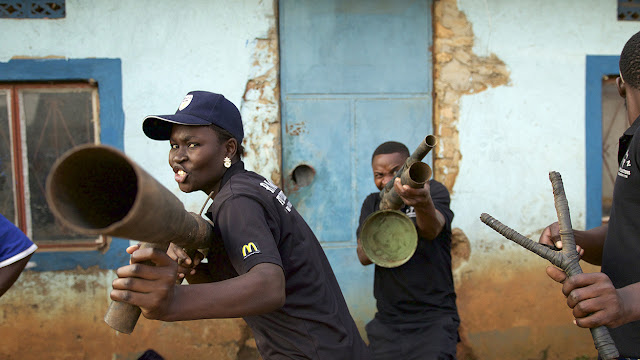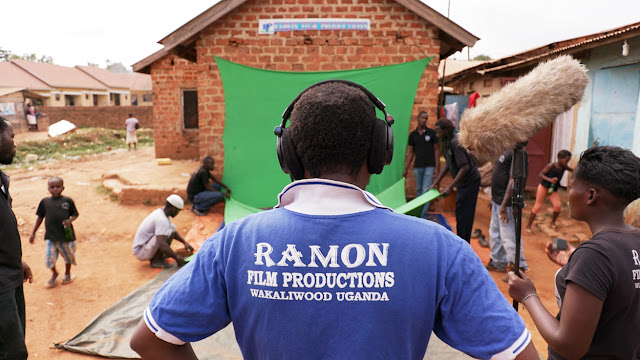If you’re a fan of action movies, you owe it to yourself to dive into the filmography of no-budget Ugandan film studio Wakaliwood. Shot in a slum, with budgets that top out in the hundreds of dollars, mastermind Isaac Nabwana, a former brickmaker, has assembled a beyond-ragtag crew that has pumped out some of the most energetic, entertaining action movies you’ll ever see. The story of how this exists in the first place is even more unlikely than the plots of the movies, and Cathryne Czubek’s documentary Once Upon a Time in Uganda tracks the saga of the wildest action movie studio around.
At its core, Once Upon a Time in Uganda is a story of two men. First there’s Nabwana, who grew up in Wakaliga, an impoverished neighborhood in Kamala, the Ugandan capital. Like, no plumbing, they only have power a few days a week impoverished. He grew up watching and worshiping the same crazy American action movies of the 70s and 80s that so many of us did and dreamed of making his own. Which he did, with cobbled-together equipment, a cast and crew of friends, neighbors, and volunteers, and prop guns crafted out of scrap metal or even sticks and tape. He churned out a ton of movies and put them on the internet.
[Related Reading: 'Bad Black' Movie Review]
Which is where the other party comes into play. Alan Hofmanis was an aimless 40-something film programmer who, after an unexpected break up, came across one of Isaac’s clips on YouTube. We often do drastic things after getting dumped, but not many of us pack up everything and fly to Uganda to track down a filmmaker we’ve never met or had any contact with, in order to help make movies and spread the word. But that’s precisely what Hofmanis did. Based solely on an online video clip.
The film hits on a lot of fronts. It tracks the ups and downs of the central friendship and the partnership between Isaac, the creative, and Alan, the marketer/evangelist. As so often happens, with wider recognition and “success” comes strife and strain and conflict that test their bonds. And the uniqueness of their circumstances only further exacerbates the tensions.
[Related Reading: 'Jungle Trap' Movie Review]
It also gives a broader look at Uganda through this incredibly specific lens. Isaac makes these unhinged, over-the-top action-comedies. But while full of violence, it’s almost cartoonish and purposely unlike the real violence he has witnessed and lived through. He grew up under Idi Amin’s regime and the aftermath, a time of political strife, poverty, and war. Supposedly he based part of his film, Who Killed Captain Alex?, on a real incident where an attack helicopter chased him and his brother. And even within their own country, the Wakaliwood team are media outsiders—they hope to use their international recognition to gain an audience and seat at the table at home.
From a grassroots filmmaking point of view, the film also offers up a fascinating behind-the-scenes glimpse at how Nabwana and company make their movies. The ultimate DIY approach, it’s basically sheer grit, supreme inventiveness, and an undying love of film. He pieces together his own cameras to film with and computers on which to edit, each one generally lasting about as long as it takes to get through a single project before dying. For all his prolific output, he’s also lost an incredible amount of footage to computer crashes, bad disks, power surges, floods, and more hazards most filmmakers never have to consider.
[Related Reading: 'Death Metal Angola' Movie Review]
Czubek’s cameras have incredible access, capturing the process, the enthusiasm, and struggles of everyone involved. At one point during an interview a good-natured kung fu fight breaks out behind the subject. More than anything else, this perfectly sums things up. Once Upon a Time in Uganda shares the story of dreamers and outsiders, and how the cost of chasing your dreams so often careens headlong into practical reality. But in the end, it’s about the love of movies, the passion for filmmaking, and finding ecstatic joy in creating absolute cinematic mayhem of the highest order. Check this out, and if you haven’t, track down movies like Captain Alex and Bad Black, among others in the Wakaliwood catalog. They’re entertaining as all hell and create more energy and life with a few hundred bucks than most studio action movies can muster with hundreds of millions. [Grade: A]





No comments:
Post a Comment